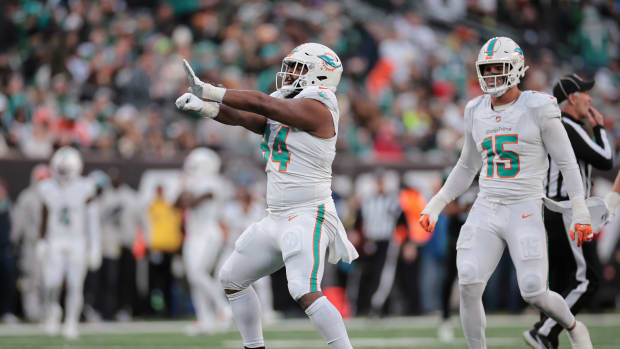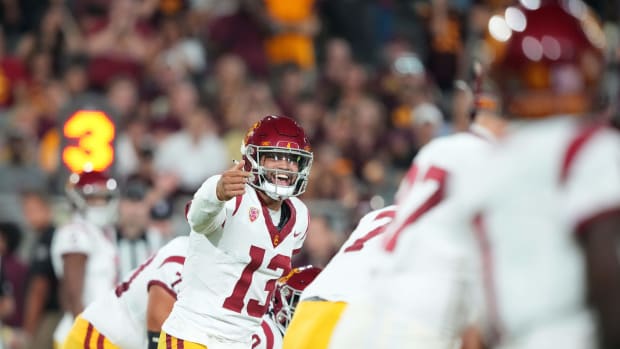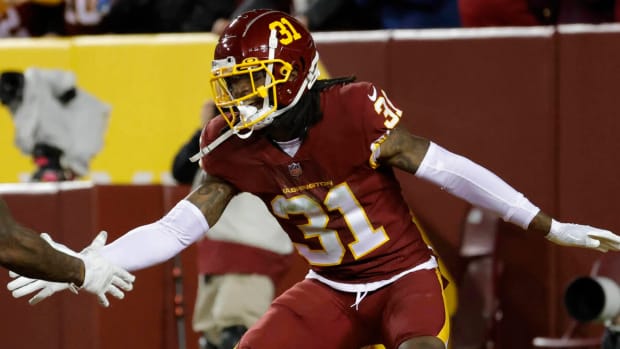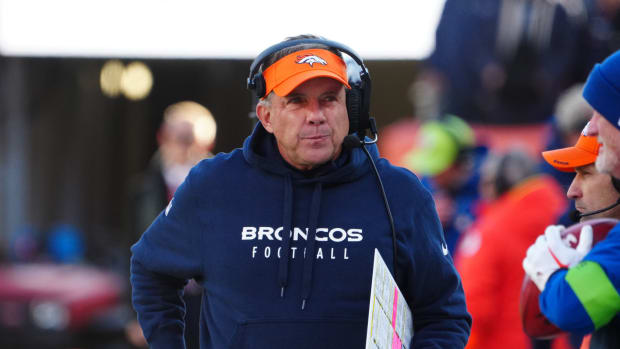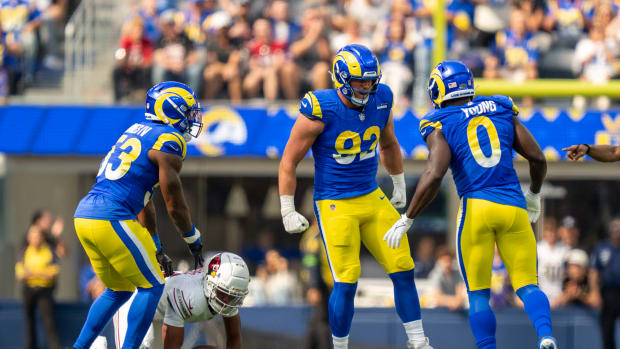Pitching a Real-life Screenwriter Three Story Lines From the 2024 Super Bowl
“Your idea seems truly bizarre,” read the opening line of an email response I received to the central question that has been bothering me during Super Bowl week. The message came from the only person who could help me, perhaps the only person who could help any of us.
Slowly, at first, and then somehow, wholly, we as a football viewing community have allowed ourselves to entertain the idea that the NFL was scripted. Even Tom Brady addressed it, noting that if the league really was conjured up in a room full of writers, it would have been weird to have him lose twice to Peyton Manning’s little brother in the Super Bowl. The idea became enough of a part of the football zeitgeist that commissioner Roger Goodell addressed it twice—twice!—during his opening news conference Monday. Taylor Swift, the referees, Brock Purdy … everyone is in on it. We’re the marks. Don’t you get it?
Personally, the problem is not whether the idea of a scripted NFL is actually true. The problem isn’t that the deep recesses of your cousin’s Instagram feed have now warranted legitimate discussion at actual news conferences.

Pizzo on a Swift-Kelce story line: “Does it appeal to me? Not really. I think the problem with the Travis Kelce story is that you’re not going to get a majority of the audience to care for, or develop a strong rooting interest in a 6'4", good-looking stud."
From left: Denny Medley/USA TODAY Sports; Chris Pedota/ NorthJersey.com/USA TODAY Network
My question was one of quality.
Basically: If the NFL really is scripted … is it any good?
And, so, yes, I emailed Angelo Pizzo, one of the greatest screenwriters and producers in modern cinema. Pizzo wrote two of the most memorable sports movie scripts of all time: Rudy (1993), the story of a runty kid from Indiana who always dreamed of playing for Notre Dame and finally made his way to the field for one beautiful moment, and Hoosiers (1986), which told a fictionalized version of the Milan High School state basketball championship run. Alcoholism. Self doubt. Life’s purpose. The movie is heavy and beautiful.
[Super Bowl 2024: Latest news and analysis | How to watch]
Pizzo is now 76. He lives in Bloomington, Ind., and he agreed to call me on his afternoon walk. I asked if I could pitch him three of the central story lines from Super Bowl LVIII and he would tell me if any would interest him as a screenwriter. He cautioned that he is mostly a college basketball fan now. The NFL sits at a semi-distant third on his sports viewing list—“I side-eye it,” he says—though he will watch the game mostly to console a nervous friend who is a San Francisco 49ers fan.
Pizzo also warns me that he is tough to convince.
“I really don’t like watching movies about true sports events,” Pizzo says, laughing. “I would have been a terrible candidate to go watch Rudy if someone else made it. Average kid who dreams of playing at Notre Dame and runs out on the field and plays 20 seconds? I mean, that sounds like one of the world’s most boring movies. I don’t think you could have gotten me to watch that film.”
Although that is part of Pizzo's magic. He added that a refrain he heard commonly from other people who had seen the film but enjoyed it was: “I don’t like sports, I don’t like football, and I hate Notre Dame.”
With that in mind, I began with a classic American fairytale.
PITCH 1: Kid from Westlake, Ohio, who has big NFL dreams gets kicked off his college football team for partying and is rescued by his older brother, only to find massive success as a professional and begins a budding relationship with the biggest pop star in the U.S.
Pizzo: “Does it appeal to me? Not really. I think the problem with the Travis Kelce story is that you’re not going to get a majority of the audience to care for, or develop a strong rooting interest in a 6'4", good-looking stud. That’s not them. And Taylor Swift is on another planet now. It all feels so out of anyone’s personal experience. You’d have to do it like, create a behind-the-scenes effect, and you could bend the fictional characters close to the real people and put them in moments where we could imagine what they would say to one another. That might appeal to some people. Not me.
“The world of a pop music superstar, like, I’ve seen all four versions of A Star Is Born, and the one that worked the best was the one with Judy Garland and James Mason. But I thought the least interesting one was the most recent one. I just didn’t care about those people.
“When I saw Travis Kelce on Saturday Night Live, I was blown away with how impressive he was. He was the best athlete [host] other than Peyton Manning. He has this weird lack of vanity that allows him to get into other characters. And he’s smart. When he and Taylor got together, it didn’t surprise me at all. Now, Taylor Swift and Rob Gronkowski? That would shock me. That’s definitely a movie I’d never go see.
“That would be a total shit show.”
Fair enough. Feeling for Kelce is a bit like feeling for the kid who zip-tied your locker shut in high school. So, next, we’re going to try something a little more familiar to audiences. A kind of twist on the modern underdog story that Pizzo has turned into an art form.

Pizzo on a Purdy-based movie: “That’s not a movie I’d be interested in writing or watching. It’s an interesting little story."
Kelley L Cox/USA TODAY Sports
PITCH 2: A boyish-looking college student with big sad cartoon eyes gets drafted dead last in the NFL draft and branded Mr. Irrelevant. Through determination, he rises to No. 1 on the 49ers depth chart, overcomes a horrific arm injury and stiff-arms the greatest quarterback of all time, Tom Brady, when his coach’s eyes begin to wander.
Pizzo: “I mean, even though he’s Mr. Irrelevant, even though he’s not the best-looking guy in the world, he was a quarterback on a Division I college team. He’s pretty damn good. He’s not Rudy. And the fact is, he was drafted. Think about all the kids who dream of playing in the NFL who don’t. I mean, should I make a movie about Trayce Jackson-Davis because he was the last pick in the NBA draft? [Note: Jackson-Davis played for Pizzo’s beloved Hoosiers.] He’s kicking ass by the way. What a stupid choice a lot of teams made not drafting him. But that’s too inside show business. I don’t think for the average viewer, being Mr. Irrelevant and struggling on a professional team, it doesn’t connect.
“One of the reasons I told Rudy’s story was that his dream was so impossible. He had to overcome people saying no and rejecting him all the way through the movie. And I think that the power of the film is that he doesn’t allow, he didn’t personalize the rejection. That makes him more heroic than Brock Purdy.
“Brock Purdy was a damn good quarterback. Iowa State isn’t a Division III program.
“That’s not a movie I’d be interested in writing or watching. It’s an interesting little story. But you’re talking about a broad audience. I don’t think so.”
All right, 0-for-2. This one will be a more modern twist on a classic. A student-becomes-the-master tale full of complicated family dynamics and the rare scenario to position Andy Reid as a kind of super villain.

Pizzo on the Shanahan story line: "Both father and son are great coaches. But, honestly, it’s just not interesting."
Kelley L Cox/USA TODAY Sports
PITCH 3: A Succession-style interfamily drama centering on the brilliant but incredibly unlucky son of a head coach who desires to best the two Super Bowl titles won by his father but always comes up short in the big game and now must best the greatest active coach in the NFL to achieve his dreams and find some semblance of personal peace.
Pizzo: “I get it. The father-son thing usually works. But, you know, it’s like, do you think anyone wants to see the story of Barry Bonds Jr. and Sr.? These are the people at the very, very top of their game. Both father and son are great coaches. But, honestly, it’s just not interesting.
“People who are into the story lines behind the NFL teams, the story lines of a team’s struggles, it’s interesting to them. But there’s not a broad-based audience. It’s like the television series on the [Los Angeles] Lakers, Winning Time? You’d have to hold my eyes open like the scene in Clockwork Orange to watch that.”
The first script that Pizzo ever wrote was the movie Hoosiers.
“And I wanted to base it on a true story, but then when I started interviewing the players and the coach and the people who lived in the town, I came to realize that this would be the most boring movie of all time,” he says. “The essence of all drama is conflict. That team loved each other. There was no fighting. No conflict. No drama. And I created the story whole cloth.”
It ended up being his only fictional screenplay of more than 40 films and an entree into a career full of perfectly dramatized moments. I asked him how he was able to bring himself all the way with both Hoosiers and Rudy, to create something with so much connective tissue that audiences can still readily quote the films decades later. Seriously, look at the best moments from both of these films. All from one person’s brain. How does Rudy turn out to be Rudy in his hands and no one else's?
What can the NFL’s fictional (or, not maybe?) scriptwriters learn from one of the best?
“I’ve never really been asked that question before,” he says. “The reason I took Rudy on, and this has been true of every movie, was that there was something I personally connected to. Growing up in Bloomington, I always hated Notre Dame. I told Rudy this when he came to visit me. There was no way I would ever do this story.
“Someone in the business once said, trying to make it in the movies is like swimming in a sea of no’s toward an island of yes’s that you’re not sure even exists. And, you climb up onto the island of yes, and you think you made it, and the island of yes begins to dissolve under your feet. Then, you’re back into a sea of no’s.”
That reminded Pizzo of Rudy. The act of not surrendering power, the act of staying the course. It was as much Pizzo as it was Daniel Ruettiger.
“It’s something I wanted for myself,” he says, adding that “everyone hated Hoosiers” when it came out. He was hearing a lot of no’s. He was searching for the island of yes.
And there, as he finished up his walk, perhaps accidentally or perhaps not, Pizzo arrived at the essence of how some of us feel about the NFL script these days. Here in Las Vegas, at the epicenter of barely real, at the top of dopamine mountain, is a game at arm’s length from its fan base, roped off and separated by barriers both emotional and physical.
Sure, it’s good enough, but not good enough to live forever. Maybe that’s the reason we talk about a script in the first place, because it’s a way for us to plasticize and, thus, make sense of a game designed for profit and attention, that is feeling less like something we can grab hold of.
Editor's note: An earlier version of this piece referenced Pizzo saying he "didn't like sports...football...or Notre Dame. In that particular quote, Pizzo was referencing what he said he had heard from the audience. The story has been updated to reflect that alteration.


































